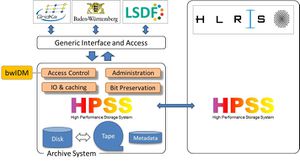BwDataArchiv: Difference between revisions
mNo edit summary |
mNo edit summary |
||
| (6 intermediate revisions by the same user not shown) | |||
| Line 2: | Line 2: | ||
==bwDataArchiv – long term digital archive== |
==bwDataArchiv – long term digital archive== |
||
The technical service infrastructure bwDataArchiv, provides archival storage for research and other public institutions in the state of Baden-Wuerttemberg. Data is stored at the Karlsruhe Institute of Technology (KIT) and comprises trustworthy large data storage for a period of ten years and more. The service enables a qualified implementation of the recommendation of the Deutsche Forschungsgemeinschaft (DFG, German Research Foundation) regarding the safeguarding and storing of research data. Further information |
The technical service infrastructure bwDataArchiv, provides archival storage for research and other public institutions in the state of Baden-Wuerttemberg. Data is stored at the Karlsruhe Institute of Technology (KIT) and comprises trustworthy large data storage for a period of ten years and more. The service enables a qualified implementation of the recommendation of the Deutsche Forschungsgemeinschaft (DFG, German Research Foundation) regarding the safeguarding and storing of research data. Further information is available on the [https://www.rda.kit.edu/english RDA web] |
||
| ⚫ | |||
Focus of the project '''bwDataArchiv''' funded by the state of Baden-Wuerttemberg, is the installation and deployment of the [[High Performance Storage System (HPSS)]]. We aim to provide institutes a reliable, high volume and economical mass storage system with interfaces for users and programmed tools. First users will be [http://www.hlrs.de/ HLRS] to store expedited projects, the LSDF counterpart in [http://www.bioquant.uni-heidelberg.de/about_us/organization/bioquant-it/it-services/large-scale-data-facility.html Heidelberg] and the [http://www.gridka.de/cgi-bin/frame.pl?seite=/welcome.html GridKa] LHC Tier1 center. |
Focus of the project '''bwDataArchiv''' funded by the state of Baden-Wuerttemberg, is the installation and deployment of the [[High Performance Storage System (HPSS)]]. We aim to provide institutes a reliable, high volume and economical mass storage system with interfaces for users and programmed tools. First users will be [http://www.hlrs.de/ HLRS] to store expedited projects, the LSDF counterpart in [http://www.bioquant.uni-heidelberg.de/about_us/organization/bioquant-it/it-services/large-scale-data-facility.html Heidelberg] and the [http://www.gridka.de/cgi-bin/frame.pl?seite=/welcome.html GridKa] LHC Tier1 center. |
||
The project |
The project enhances existing services and contribute technology with the development of a generic and open interfaces to mass storage based on current practice and applications. |
||
| ⚫ | |||
| ⚫ | |||
[[Description and scope of the service]] |
== [[Description and scope of the service]] == |
||
| ⚫ | |||
Latest revision as of 15:34, 1 December 2016
bwDataArchiv – long term digital archive
The technical service infrastructure bwDataArchiv, provides archival storage for research and other public institutions in the state of Baden-Wuerttemberg. Data is stored at the Karlsruhe Institute of Technology (KIT) and comprises trustworthy large data storage for a period of ten years and more. The service enables a qualified implementation of the recommendation of the Deutsche Forschungsgemeinschaft (DFG, German Research Foundation) regarding the safeguarding and storing of research data. Further information is available on the RDA web
Focus of the project bwDataArchiv funded by the state of Baden-Wuerttemberg, is the installation and deployment of the High Performance Storage System (HPSS). We aim to provide institutes a reliable, high volume and economical mass storage system with interfaces for users and programmed tools. First users will be HLRS to store expedited projects, the LSDF counterpart in Heidelberg and the GridKa LHC Tier1 center.
The project enhances existing services and contribute technology with the development of a generic and open interfaces to mass storage based on current practice and applications.

